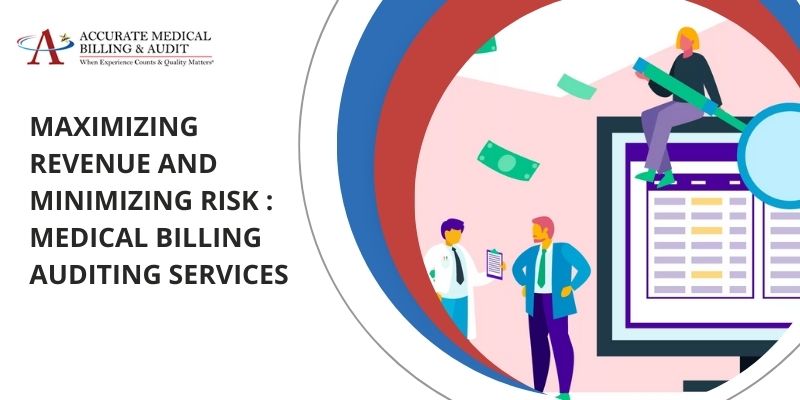Auditing is an essential component of any business across all industries. It is an excellent tool for ensuring that the revenue management cycle is carried out correctly, adhering to rules and laws, and determining where internal processes need improvement. Particularly about auditing, this is true when it comes to medical billing.

Types of Medical Claim Audits
No matter the size of your organization, you can audit medical claims and billing. Your medical billing system can stay organized and generate enough revenue by conducting routine audits.
The types of audits that are conducted in medical settings include the following:
Comprehensive audit: This audit has a broader scope because it looks at several previously audited claims and includes manual and electronic evaluations. Its main objective, which aligns with the overall aim of the comprehensive audit, is to make it easier for claim administrators to retrieve reimbursements for submitted claims.
Random sample audit: Selected claims for this audit process include significant and minor claims and are chosen based on the insurance funds they cover. As opposed to the number of claims involved, the focus is primarily on the monetary values. A random audit can act as a stepping stone to a more thorough audit review, even though it does not directly result in financial reimbursements from insurers.
Hybrid unit: To achieve dual outcomes, including financial recovery and regulatory adherence, a hybrid audit combines the components of random sample audits and thorough reviews. Additionally, it emphasizes the importance of promptly recovering overpayments.
The Benefits of Medical Billing Auditing Services

With adequate supervision, managing medical claims can be easy and inexpensive. Auditing medical claims becomes necessary for several reasons, including spotting billing errors, developing plans to improve reimbursement chances, and ensuring that medical practices adhere to the most recent compliance regulations governing such claims.
If all these are followed, then revenue can be maximized, and risk minimized, resulting in the following benefits:
1. Ensures accurate claim submission
Audits play a crucial role in medical billing and claim submission by carefully examining each minute detail. This thorough examination ensures that every step of the procedure adheres to the necessary standards, reducing the possibility of insurance companies denying future claims.
Additionally, the entire revenue cycle becomes more effective and efficient, improving the medical practice’s or facility’s overall financial situation after a thorough audit. This increased revenue stream enables healthcare providers to allocate funds for better patient care, invest in cutting-edge medical technology, and raise the overall standard of care.
2. Prevents and reduces improper payment
Audits offer a thorough analysis of both regular and irregular payments. This helps provide information on handling subsequent transactions with your claims partner. They offer a clear view of improvements and the best approaches while exposing the reasons behind delays in claim reimbursements and medical billing systems.
Generally, this helps to mitigate payment difficulties and prevent the inflow of insufficient funds into your medical practice.
3. Enhances patient care
Regular audits are essential for enhancing the focus on patient care within your medical practice and accelerating reimbursements. These audits allow you to manage your operations and allocate more time and resources to serve your patients effectively. All these can be achieved by establishing a seamless and streamlined medical billing and claims processing workflow.
When audits are conducted regularly, they ensure that the billing and claims procedures are operating at optimal levels. As a result, claims are processed promptly, leading to faster reimbursements. This financial stability not only contributes to the overall revenue health of your practice but also facilitates the allocation of resources to enhance patient services.
4. Instant feedback on the performance of staff
You have a great chance to identify your staff’s excellent and subpar performance when you conduct internal medical audits. With the help of this platform, you can give your team members immediate advice about areas that need improvement.
These audits also instill a sense of accountability in your staff by pointing out mistakes and flaws. As a result, your staff becomes more aware of their responsibilities, fostering an environment where high accountability and performance are excellent within your medical practice.
5. Reduces the chances of external audits
When your internal medical audits are successful, there is no need to allocate time or money to external audits. This is especially true when identifying areas that require correction and providing plenty of room for improvement.
In addition to streamlining operations, your well-organized internal assessment processes also eliminate the need for additional external scrutiny, ultimately resulting in optimized resource utilization within your medical practice.
6. Cost-benefit analysis and compliance
Using audits as a strategic tool, your practice can quickly identify opportunities to recover pending or delayed funds. Additionally, audits offer a platform for implementing new policies and procedures intended to stop the repetition of previous staff mistakes.
This dual strategy gives your practice various benefits by improving financial efficiency and ensuring compliance with regulatory requirements.
7. Training in weak areas
Internal audits are crucial in determining how well your staff performs regarding medical billing and claims services. These audits provide insightful information that helps identify areas where your staff may encounter difficulties.
This knowledge helps to lay the foundation for focused training initiatives. It gives your team the tools to deal with challenges and ensure more excellent proficiency across the medical billing and claims processes.
Conclusion
Collaborate with a top medical billing auditing service to streamline your internal audit procedures easily. You can avoid the difficulties of tasks related to documentation and audits by relying on their knowledge. Data about your patients is handled with the utmost security, allowing you to concentrate on crucial tasks. This way, you maximize revenue and minimize risk.






I’ve been surfing on-line more than 3 hours these days, yet I never discovered any interesting article like yours. It…